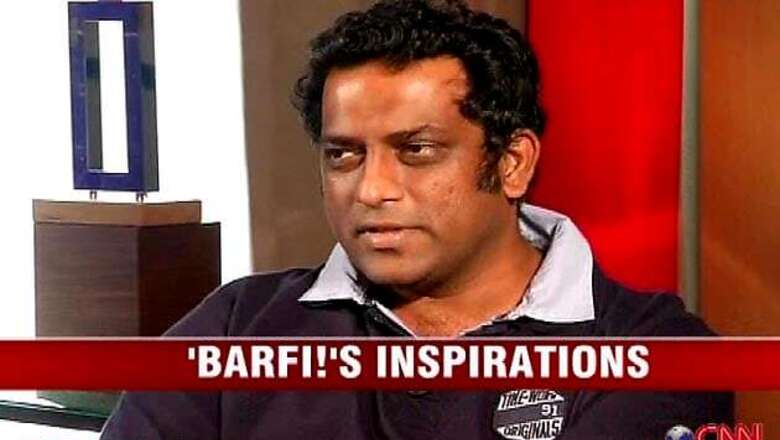
views
I steal from every single movie ever made. I love it. If my work has anything it's that I’m taking this from this and that from that and mixing them together. If people don't like that, then tough titty, don't go and see it, alright? I steal from everything. Great artists steal; they don't do homages. - Quentin Tarantino
I could not possibly begin this write-up without quoting one of new wave cinema's greatest campaigners and virtuoso extraordinaire. As director Anurag Basu found himself at the centre of a shocking debate over his film 'Barfi', this quote of Tarantino added an extra dimension to the commentary on creative license versus blatant plagiarism.
Much before the hushed whispers on online forums exploded into indignant outburst over 'copied' scenes from world masters, 'Barfi' was meant as a sentimental tribute to joie de vivre.
A film that scoffed at established stereotypes about the disabled without pontificating from the high pulpit of cinema? Barfi seemed to be a keeper.
Weren't the sternest critics convinced that they were finally watching great cinema? Basu, the maker of the crime thrillers Murder and Gangster, seemed to have completely swept everyone off their feet with the airy 'Barfi'.
Homage vs Plagiarism
But as the film went out to a larger audience with access to a veritable bank of film trivia on the internet, the allegations of plagiarism kept pouring in. If you accepted that the scenes reproduced from Charlie Chaplin and Buster Keaton films were Basu's tribute to filmmakers he respected, what would you make of the ten odd other sources of 'inspiration'? Were they tributes too?
Influence isn't necessarily a detriment to creativity. But is Barfi a plagiarised product? Without due credit to the great masters of cinema who have so obviously influenced him, it is. Basu said in an interview to CNN-IBN that he revisited scores of silent films to get a grasp of the physical comedy that he was planning to use in Barfi. He said the film was intended as homage.
But it isn't enough to state his intent in media interactions. The film's opening or closing credits had no mention of his sources and it appears now that there were many.
More revelations
I have absolutely no doubt that years from now, Barfi will be remembered by Indian audiences, largely unaffected by the plagiarism charges, as a unique film. But Basu lost some of the respect due to him despite extracting two great performances from the lead artistes and packaging a beautiful film.
The cinema blog Tanqeed was the first to spot the obvious sources of influence. This is the story we wrote at the time of release of Barfi. The Mumbai Mirror followed up with names of more films from the open discussions on various forums, including that of Tanqeed's.
The list of films Tanqeed and Mumbai Mirror claimed 'Barfi' is sourced from is quite long and disturbing. Scenes were said to be either lifted from or influenced by Kikujiro, Benny & Joon (1993), Korean film Oasis (2002), Chaplin's City Lights (1931), Mr Bean's Holiday, Jackie Chan's Project A (1983), Buster Keaton's Cops (1922), The Notebook (2004), Mr Nobody (2009), Black Cat, White Cat (1988), The Goonies (1985) and Fried Green Tomatoes (1991).
Let's consider four scenarios.
A: That Basu is genuinely a wide-eyed devotee of world cinema and has incorporated the best of several filmmakers in Barfi as an open and obvious homage. If you spot the films he copied from, you were meant to. What's the big fuss?
B: That Basu 'forgot' to credit his sources knowing that plagiarism in India is not treated with the same seriousness that it is in the West and the collective memory of the Indian audiences is only as good as the last Friday. You have to also consider that in the longer run films are seen qualitatively. Controversies surrounding a film have rarely ever marred its long-term prospects. You remember 'Mughal-e-Azam' as a classic and not because of the marathon delay in its release that almost caused director K Asif's ruin. Barfi is a beautifully executed film and Basu was probably counting on people turning a blind eye to its flaws by playing on their sympathy. Who can resist a deaf-mute protagonist who is joyously unfettered by his disability?
C: Hollywood films have borrowed elaborately from old masters. The trend is neither new nor novel. The climactic scene of The Untouchables where a pram carrying a baby rolled down a staircase at the Union Station in Chicago, was inspired from The Battleship Potemkin, a 1925 silent film about the 1905 mutiny of the crew of the Russian battleship. The iconic Odessa Steps Massacre scene has been used dozens of times in films around the world, including Untouchables, with due credit to the source. Here are 10 famous scenes and the movies they were inspired by.
In many instances in Barfi, Basu not just adapted but directly reproduced scenes from films such as Kikujiro where Ranbir instructs Priyanka on how to place nails on the road to snare a car tyre. Had he openly admitted to incorporating portions of the films he loved, Basu could have salvaged much of the face he lost.
One good thing has come off this controversy. It has triggered an interest in obscure classics. Until now, not everyone had heard of Buster Keaton or seen The Notebook (Rupa Ganguly's lumber yard scene was copied from here). Barfi prompted people to revisit the silent era of filmmaking, watch the classics and compare for themselves the similarities between the films. This is also part of cinematic education.
To sum up
Bollywood movies are regularly copied from the films made in the four southern states every day. Some of the recent Hindi movies are poor reproductions of classy southern hits. Barfi is at least a well made product. But I cannot ignore the fact that ethically Basu is bound to answer his critics and take responsibility in one way or another for his choices in Barfi.
As a creative artiste, a filmmaker or a professional whose credibility has been questioned, he owes an explanation - to the people who showered him with affection after Barfi, to an audience that now expects great things from him and to cinema in general.
####




















Comments
0 comment